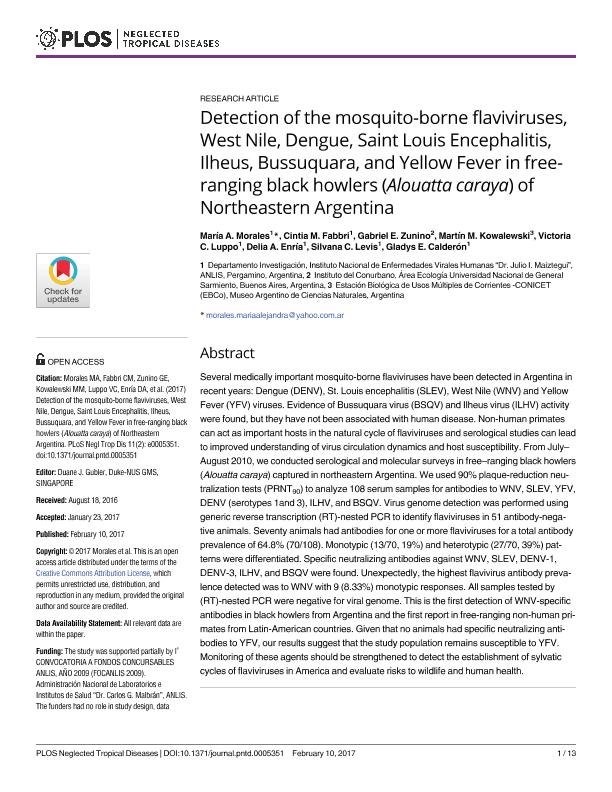Artículo
Detection of the mosquito-borne flaviviruses, West Nile, Dengue, Saint Louis Encephalitis, Ilheus, Bussuquara, and Yellow Fever in free-ranging black howlers (Alouatta caraya) of Northeastern Argentina
Morales, Maria Alejandra; Fabbri, Cintia M.; Zunino, Gabriel Eduardo ; Kowalewski, Miguel Martin
; Kowalewski, Miguel Martin ; Luppo, Victoria C.; Enría, Delia A.; Levis, Silvana C.; Calderón, Gladys Ethel
; Luppo, Victoria C.; Enría, Delia A.; Levis, Silvana C.; Calderón, Gladys Ethel
 ; Kowalewski, Miguel Martin
; Kowalewski, Miguel Martin ; Luppo, Victoria C.; Enría, Delia A.; Levis, Silvana C.; Calderón, Gladys Ethel
; Luppo, Victoria C.; Enría, Delia A.; Levis, Silvana C.; Calderón, Gladys Ethel
Fecha de publicación:
02/2017
Editorial:
Public Library of Science
Revista:
Neglected Tropical Diseases
ISSN:
1935-2735
Idioma:
Inglés
Tipo de recurso:
Artículo publicado
Clasificación temática:
Resumen
Several medically important mosquito-borne flaviviruses have been detected in Argentina in recent years: Dengue (DENV), St. Louis encephalitis (SLEV), West Nile (WNV) and Yellow Fever (YFV) viruses. Evidence of Bussuquara virus (BSQV) and Ilheus virus (ILHV) activity were found, but they have not been associated with human disease. Non-human primates can act as important hosts in the natural cycle of flaviviruses and serological studies can lead to improved understanding of virus circulation dynamics and host susceptibility. From July–August 2010, we conducted serological and molecular surveys in free–ranging black howlers (Alouatta caraya) captured in northeastern Argentina. We used 90% plaque-reduction neutralization tests (PRNT90) to analyze 108 serum samples for antibodies to WNV, SLEV, YFV, DENV (serotypes 1and 3), ILHV, and BSQV. Virus genome detection was performed using generic reverse transcription (RT)-nested PCR to identify flaviviruses in 51 antibody-negative animals. Seventy animals had antibodies for one or more flaviviruses for a total antibody prevalence of 64.8% (70/108). Monotypic (13/70, 19%) and heterotypic (27/70, 39%) patterns were differentiated. Specific neutralizing antibodies against WNV, SLEV, DENV-1, DENV-3, ILHV, and BSQV were found. Unexpectedly, the highest flavivirus antibody prevalence detected was to WNV with 9 (8.33%) monotypic responses. All samples tested by (RT)-nested PCR were negative for viral genome. This is the first detection of WNV-specific antibodies in black howlers from Argentina and the first report in free-ranging non-human primates from Latin-American countries. Given that no animals had specific neutralizing antibodies to YFV, our results suggest that the study population remains susceptible to YFV. Monitoring of these agents should be strengthened to detect the establishment of sylvatic cycles of flaviviruses in America and evaluate risks to wildlife and human health.
Palabras clave:
PRIMATOLOGY
,
VIRUS
,
PUBLIC HEALTH
,
YELLOW FEVER
Archivos asociados
Licencia
Identificadores
Colecciones
Articulos(CCT - NORDESTE)
Articulos de CTRO.CIENTIFICO TECNOL.CONICET - NORDESTE
Articulos de CTRO.CIENTIFICO TECNOL.CONICET - NORDESTE
Articulos(SEDE CENTRAL)
Articulos de SEDE CENTRAL
Articulos de SEDE CENTRAL
Citación
Morales, Maria Alejandra; Fabbri, Cintia M.; Zunino, Gabriel Eduardo; Kowalewski, Miguel Martin; Luppo, Victoria C.; et al.; Detection of the mosquito-borne flaviviruses, West Nile, Dengue, Saint Louis Encephalitis, Ilheus, Bussuquara, and Yellow Fever in free-ranging black howlers (Alouatta caraya) of Northeastern Argentina; Public Library of Science; Neglected Tropical Diseases; 11; 2; 2-2017; 1-13
Compartir
Altmétricas



